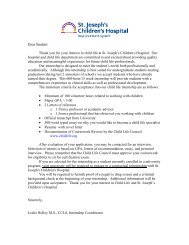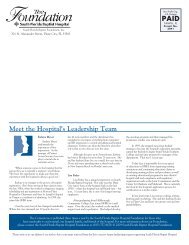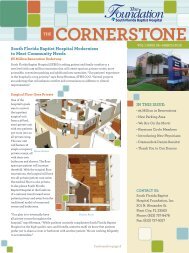Meet the Hospital's Leadership Team PAID - St.Joseph's Hospital
Meet the Hospital's Leadership Team PAID - St.Joseph's Hospital
Meet the Hospital's Leadership Team PAID - St.Joseph's Hospital
You also want an ePaper? Increase the reach of your titles
YUMPU automatically turns print PDFs into web optimized ePapers that Google loves.
Eight Ways to a Better Estate Plan<br />
If you haven’t done so already, today is <strong>the</strong> day to<br />
begin planning your estate. Thinking ahead can save you<br />
many tax dollars, and with estate tax rates reaching up to<br />
55 percent in 2011, this should be of primary importance<br />
to you. In addition, you want to control <strong>the</strong> disposition of<br />
your property at death.<br />
Below are some tips to help you make certain your<br />
estate is properly planned.<br />
1. Update Your Will or Living Trust<br />
Your will or trust is <strong>the</strong> most important component of<br />
your estate plan. It is <strong>the</strong> basis for distributing <strong>the</strong> majority<br />
of your assets. Your will or trust should be updated<br />
every three to five years and also after times of personal<br />
change, such as marriage, death, divorce, birth, adoption,<br />
inheritance or a move to ano<strong>the</strong>r state.<br />
2. Consider Taxes<br />
Your estate plan may need to be updated because<br />
of frequent tax law changes to <strong>the</strong> federal estate tax<br />
exemption amount. Even though estate taxes are repealed<br />
for deaths that occur in 2010, <strong>the</strong>y will reappear in 2011—<br />
<strong>the</strong>n your estate can be worth only $1 million before<br />
estate taxes are owed.<br />
Just call <strong>the</strong> Foundation office<br />
at 757-8478 if you’d like more<br />
information. We have several<br />
helpful and informative brochures<br />
available at no cost.<br />
3. Choose an Executor or Trustee<br />
Think long and hard about <strong>the</strong> individual or<br />
institution named to act as your executor or trustee,<br />
bearing <strong>the</strong> responsibility of carrying out your wishes<br />
after death. You will want to name someone you trust<br />
implicitly, someone who is experienced to act. You may<br />
consider naming a loved one along with an experienced<br />
financial institution.<br />
4. Name a Power of Attorney<br />
Assign someone to act for you to handle your financial<br />
affairs in <strong>the</strong> event that you are unable to do so yourself.<br />
Property can also be managed, and disposition rights<br />
granted, through a durable power of attorney.<br />
5. Create a Living Will<br />
Draft a living will that makes your wishes known<br />
regarding extraordinary measures for keeping you alive.<br />
A living will allows decisions to be made when you are<br />
unable to communicate your wishes. This document<br />
can help family members who may be distraught make<br />
decisions based upon your stated wishes. You should<br />
inform your family members of your wishes in advance.<br />
6. Check Up on Insurance<br />
Evaluate your insurance periodically. Make sure that<br />
you have enough to cover changing needs.<br />
7. Watch Your Investments<br />
Commit to learning more about investments. Your<br />
finances are your future, and <strong>the</strong> more you learn, <strong>the</strong> easier<br />
and more interesting it becomes.<br />
8. Be Charitable<br />
An unlimited amount of money can be given to a<br />
qualified charitable organization during your lifetime or at<br />
your death, free of federal gift and estate taxes. Charitable<br />
gifts are an important component of any estate plan and<br />
may be especially helpful for<br />
people who do not have heirs<br />
to consider when distributing<br />
<strong>the</strong>ir estate.<br />
Through gifts to a<br />
charitable organization, you<br />
can benefit during life and<br />
at death—and reduce your<br />
taxable estate as well.<br />
The Key Components to<br />
Your Estate Plan<br />
• Will/Trust<br />
• Executor/Trustee<br />
• Power of Attorney<br />
• Living Will<br />
• Life Insurance<br />
• Investments<br />
• Annual Exclusion Gifts<br />
• Charitable Gifts<br />
The information in this<br />
article is not intended as<br />
legal advice. For legal advice,<br />
please consult an attorney.<br />
Figures cited in examples are<br />
for hypo<strong>the</strong>tical purposes only<br />
and are subject to change.<br />
References to income tax apply<br />
to federal taxes only. Federal<br />
estate tax, state income/estate<br />
taxes or state law may impact<br />
your results.

















